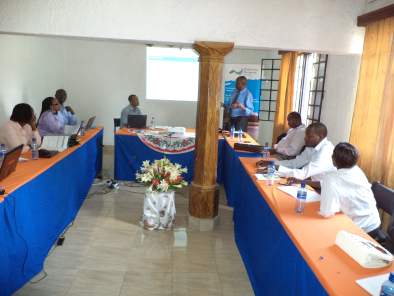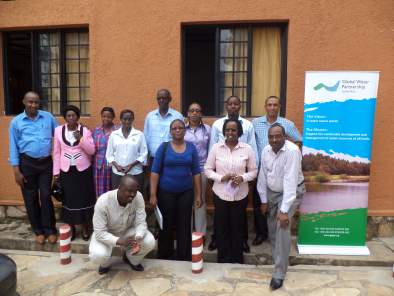The Water, Climate and Development Program(WACDEP) was developed following 2009 African Ministers’ Council on Water (AMCOW) decision to fast-track the implementation of the Sharm el-Sheikh Declaration on Water and Sanitation.
WACDEP seeks to support the integration of water security and climate resilience in the development planning and decision-making processes through investment in water security and climate change adaptations.

The meeting which took place in Burundi’s capital Bujumbura was attended by District Administrator for Busoni Commune, Mme Kabihogo Léocadie, Administrator for Bugabira Commune, Mme Ndubwimana Consolate, Kirondo Province, Burundi, and Muyengeza Jean de Dieu for Kamabuye Sector, Busegera District, Eastern Province, Rwanda and Country Water Partnership representatives from Rwanda and Burundi.
Presenting the project activities, GWPEnA Regional Coordinator, Mr. Safari Patrick told local government officials that it is GWP’s tradition to engage with multi-layered actors for buy-in and garner local ownership of water and trans-boundary related projects.
To this end, the GWPEnA cannot afford underestimating the capacity of the local government officials in the three areas to mobilize citizen participation and ownership of the activities in Bugesera Trans-boundary Project.
“the success of the Bugesera Trans-boundary Projects rests on collective efforts of citizens, local government and GWPEnA’s support,” Safari emphasized.
Illuminating on the objectives and rationale of the consultative meeting with specifically local government officials, GWPEnA Regional Coordinator also added that: “nobody else is better placed to know citizens’ challenges, needs and interests than local government officials.”
“To maximize the project outcomes, it is recommendable that the project focuses on priority activities in one area and thereafter scale up to other areas.” Kabihogo Léocadie advised. Concentrating the project outputs in one area for increased project impacts was strongly recommended by most participants from Rwanda and Burundi.
“Focusing project resources in one area enables creation of village models and offers enough lessons for replication to other areas.” John Gakuba, Rwanda Water Partnership, Vice Chairperson contended.
Adolphe Mbonimpa, Director of Agriculture and Livestock at Kirundo Province, Burundi commended the project’s approach of conducting a systematic evidence-based situation analysis prior to the project implementation.
He mainly lauded the project for considering the early warning systems as a proactive response to the hazardous climatic conditions that have periodically disorganized livelihoods in the Rwanda-Burundi communes (districts). Mbonyimana hopes that at the end of the project, the targeted areas will be more resilient to ever-changing climatic conditions.
Historically, Busoni, Bugabira (Burundi’s communes) and Bugesera District (Rwanda’s) face persistent drought brought by climatic changes and unfriendly human practices such as over-cultivation, deforestation and unregulated livestock farming methods. In Eastern Africa, WACDEP will be implemented at Kagera basin, Rwanda-Burundi national level and Bugesera Trans-boundary water catchment. The Bugesera project’s main activities will include among others:
- establishing a framework for implementing climate adaptive measures at various levels;
- providing training and demonstrating climate responsive agricultural and natural resources management practices,
- strengthen capacities of key stakeholders and local communities through behavior change awareness campaigns;
- strengthen communities’ local early warning and flood management systems.
